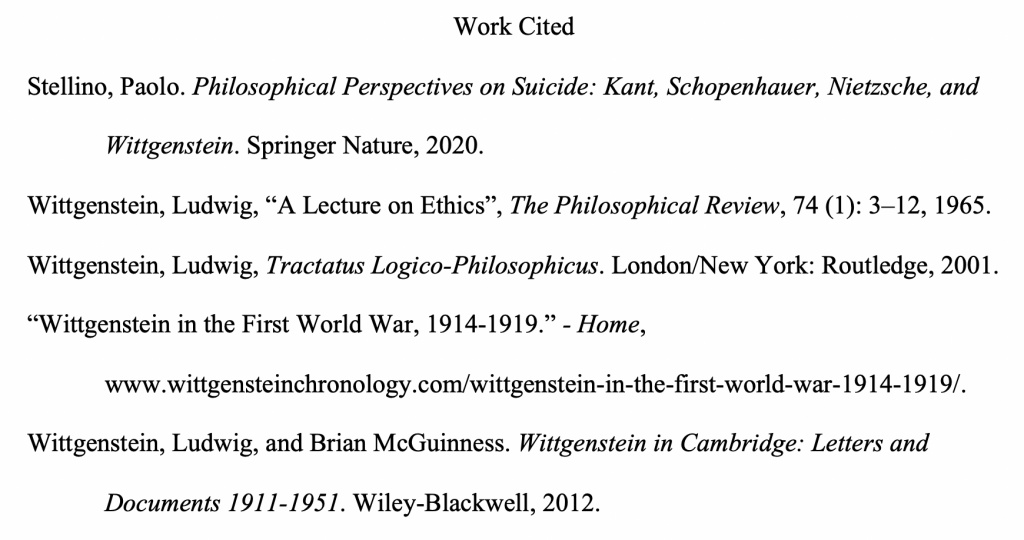The concept of death must not be unfamiliar to Wittgenstein: three of his four brothers took their own lives. But when suicide, especially the suicide of family members, happened repeatedly around Wittgenstein, he chooses to face this problem of living, even it surrounded by pain.
Suicide is a special way of death. Wittgenstein always views suicide from a moral and ethical perspective (Stellino).
“If suicide is allowed then everything is allowed.
If anything is not allowed then suicide is not allowed.
This throws a light on the nature of ethics, for suicide is, so to speak, the elementary sin.
And when one investigates it, it is like investigating mercury vapour in order to comprehend the nature of vapours.
Or is even suicide in itself neither good nor evil? (Wittgenstein) ”
These sentences didn’t contain complete logical reasoning, but it’s enough to say that Wittgenstein sees suicide as a sin that needs to be avoided. The importance of ethics in Wittgenstein’s thought system was shown here by his consideration of death’s ethics. Another piece of source revealed the explanation from Wittgenstein to his own works on ethics to us. In a well-known letter to Ludwig von Ficker, whom he had hoped to publish the Tractatus, Wittgenstein wrote: “My work consists of two parts, the one presented here plus all that I have not written. And it is precisely this second part that is the important point. For the ethical gets its limit drawn from the inside, as it were, by my book; […] I’ve managed in my book to put everything firmly into place by being silent about it (Wittgenstein).” And in “A Lecture on Ethics”s, he said that “Ethics is the enquiry into what is valuable, or, into what is really important, or I could have said Ethics is the enquiry into the meaning of life, or into what makes life worth living, or into the right way of living.”
It is safe for us to conclude that the life for Wittgenstein himself is suffering. It is obvious to find in his diaries and the letters with friends that he was long troubled by autolesion thoughts, suicidal thoughts and depression. But under these heavy mental stresses, there’s no evidence that can prove that he had ever committed suicide like his brothers. Some say that Wittgenstein joins the First World War is for the reason of suicidal thoughts. But the truth is that this experience of war, or even nearly to death, is an attempt for him to find the reason to keep living. As he wrote in his diaries, “[m]aybe, proximity to death will bring the light of life” (Wittgenstein), and “[o]nly death gives life its meaning” (Wittgenstein). We can see Ludwig’s thoughts or even desire to “living a good life” through his interpretation of his own action.
“I can die in an hour, I can die in two hours, I can die in a month or only in a few years. I can’t know or help or do anything about it: that’s how life is. How should I live so as to be able to die at any moment? Live in the beautiful and the good, until life itself ceases (Wittgenstein).”
“Death is unavoidable”. This assumption can be found in all of Wittgenstein’s discussion about life. But he often shows a positive attitude towards the life that eventually meets death, which can let people correlated with the “hidden” part of his work: is his whole attitude and action that face life, no matter painful or not, another part of his work and the things he wants to show to the people who are thinking the same question?
All in all, combine Ludwig’s thoughts from both topics of “suicide” and “happy life”, the sin of suicide and the thoughts to insist pursue a life with happiness in the present pain, can be the reason for each other: for the sake of avoiding the guilty of suicide and the willing to pursue the happiness of life in an ascetic way; gives the sinful meaning to suicide because of the persistence on the pursuit of happy life regardless of the pain.
Through all these struggles, still, we can’t find any final answer or reasoning for the problem of death and the meaning of life directly from Wittgenstein’s works. In his opinion, philosophy as a mindset and the base of these problems of life, may not be the best way of giving the answer in the form of philosophy itself because of its limitations: He thinks that philosophy is just for critique the boundaries and limitations of the language. Thus, as he wrote in Tractatus Logico-Philosophicus: “The solution of the problem of life is seen in the vanishing of the problem”. Just like his opinion on the ethics problem, which is the philosophy about the problems of life, cannot be expressed in a way of philosophical language.
When the death truly came to Ludwig, as the appearance of cancer, he wrote to Malcomb in January 1951: “My mind’s completely dead. This isn’t a complaint, for I don’t really suffer from it. I know that life must have an end once and that mental life can cease before the rest does. – Your pull-over is wonderful and fits me perfectly.” He didn’t show any of the afraid of death, but only the acceptance of the ending on all aspects of life including the mental life.
It now appears that he did complete the “hidden” part of his work, by he put in action to face the life and finally “have had a wonderful life”.

